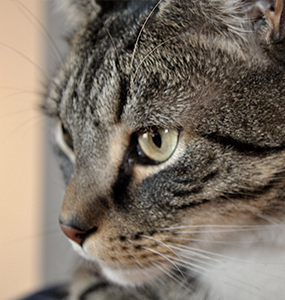Is There A Way To Ease The Pain If Animal Is Dying From Decon Poisoning?

Dr. Justine Lee explains the dangers of active ingredients in rat and mouse poisons. For more from Dr. Lee, detect her on Facebook!
Every bit the weather gets colder, mice and rats commencement seeking shelter in warm locations… in other words, your house! Unfortunately, the start of autumn means the start of mouse and rat poisoning, putting your dog or cat at risk.
In today's blog, we'll talk about the 4 different types of active ingredients plant in these mouse and rat poisons. These poisons all work (and impale) in different ways, and then pay mind!
While the nearly mutual type of mouse poison (e.g., brodifacoum, bromadiolone, etc.) often affects your dog's power to clot properly, new EPA mandates by the government are reducing the availability of this specific type of poison (called an anticoagulant rodenticide or "ACR"). Unfortunately, this means that newer, dissimilar types of poisons are cropping up. Not even all veterinarians are aware of these newer active ingredients!
Depending on what type of mouse and rat poison was ingested, clinical signs can vary. When in doubt, please don't use these poisons around your house if yous take pets. I'm never an abet of using these types of poisons, as they pose a threat to wild animals, pets, and birds of prey (due east.g., raptors like ruby-tail hawks, owls, etc.). I'd rather y'all apply the more human snap trap – much safer to you lot and your pet!
 Anticoagulant rodenticides (ACR)
Anticoagulant rodenticides (ACR)
These ACRs inhibit the production of Vitamin-1000 dependent blood clotting factors (fabricated in the liver), so when ingested in toxic amounts past dogs or cats, information technology can outcome internal haemorrhage. Thankfully, there'south an antidote for this type of mouse and rat poison: Vitamin K1, a prescription medication readily available at your veterinarian. With ACR poisoning, clinical signs don't have bear on for 3-v days. However, left untreated, ACR poisoning can be fatal. Signs to await out for include:
- Lethargy
- Difficulty breathing
- Pale gums
- Coughing (specially of claret)
- Vomiting (with claret)
- Encarmine olfactory organ
- Swelling or bumps on the skin (e.g., hematomas)
- Plummet
- Haemorrhage from the gums
- Death
Treatment includes decontamination, Vitamin K1 orally (typically for 30 days), claret transfusions, plasma transfusions, oxygen, and supportive care.
Cholecalciferol (Vitamin D3)
As an emergency critical care veterinary specialist, this is my most hated type of poisoning. Only a small corporeality can result in severe poisoning in both dogs and cats. This type of mouse and rat poison results in an increased amount of calcium in the body, leading to kidney failure. Unfortunately, this blazon has no antidote, and is very expensive to treat, as pets typically need to exist hospitalized for iii-vii days on aggressive therapy. Clinical signs include:
- Inappetance/anorexia
- Sluggishness/weakness
- Decreased or increased thirst/urination
- Halitosis
- Kidney failure
- Tremors
- Weight loss
- Death
Treatment includes aggressive IV fluids to affluent the calcium and kidney poisons out, medications to aid subtract the body's calcium level (e.yard., pamidronate, calcitonin, steroids, diuretics), and frequent blood piece of work monitoring.
 Bromethalin
Bromethalin
While this blazon of mouse and rat toxicant sounds like some ACR types (e.g., bromadiolone, brodifacoum), it's totally unrelated to clotting and is not treated with Vitamin 1000. This is a mouse and rat poison doesn't have an antidote, and works causing brain swelling (e.k., cerebral edema). Clinical signs include:
- Lethargy or anxiety
- Walking drunkard
- Vomiting
- Tremoring
- Seizuring
- Coma
- Expiry
Treatment includes inducing vomiting, administering activated charcoal, Four fluids, anti-seizure medication, muscle relaxants, and supportive care.
Phosphides
While this type of poisonous substance is less common, yous should care, every bit information technology's potentially poisonous to you, your family, and your veterinary staff! Phosphides are typically used to kill slightly bigger creatures like moles and gophers (and is less unremarkably used equally an agile ingredient in mouse or rat poisons). When ingested, the phosphides production a toxic gas in the tummy called phosphine gas. Clinical signs include:
- Drooling
- Bloat
- Gastric-dilatation volvulus
- Inappetance
- Anorexia
- Lethargy/weakness
- Difficulty breathing
- Death
Handling includes not feeding your canis familiaris (no milk, bread or other "anti-poison home remedies"). That's because if there'south food in the stomach, it actually makes the poisoning worse and results in more than phosphine gas production. This same gas is poisonous to humans as well, and so make sure you don't inhale the gas. In other words, if you're driving to your veterinary clinic and your dog vomits at home or in the machine, make sure to ventilate the area well (e.g., open the windows, plough on the air conditioner in the auto, etc.). Likewise, when the veterinary staff induces vomiting in dogs ingesting phosphides, they should do so exterior or in a well-ventilated area. Treatment includes anti-vomiting medication, antacids, Iv fluids, and supportive care.
If you're not scared off by mouse and rat poisons now, your dog'southward in trouble! When in uncertainty, keep all mouse and rat poisons out of attain of your family unit, children, and pets. If accidentally ingested, contact your veterinary immediately to notice out how to treat it. With ambitious treatment, the prognosis is off-white to excellent, depending on what type of poison they got into. Equally with most poisons, the sooner you place the poisoning, the sooner you treat it, the less problems for your pet (and the less cost to y'all!).
If you take any questions or concerns, yous should ever visit or call your veterinarian – they are your best resource to ensure the health and well-beingness of your pets.
Source: https://www.pethealthnetwork.com/dog-health/dog-toxins-poisons/dangers-rat-poison-dogs-and-cats
Posted by: gutierrezforood.blogspot.com

0 Response to "Is There A Way To Ease The Pain If Animal Is Dying From Decon Poisoning?"
Post a Comment